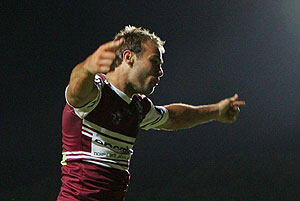LISTEN: Souths acting coach's blunt, one-word response to Latrell centres question
A pretty emphatic answer from Ben Hornby!

Brett Stewart celebrates after he scoring his 73rd try for Manly - AAP Image/Action Photographics, Grant Trouville
As a life long Parramatta Eels supporter, it takes a significant amount of off-season reflection, goodwill and pathos for me to feel much sympathy for anyone wearing Manly colours.
But the start of Brett Stewart’s alleged sexual assault trial has got me thinking about the way our sports administrators and media tend to act as Judge Judy and Executioner (with thanks to H. Simpson) whilst a legal case remains very much alleged and a player very much innocent until proven guilty.
Of particular interest is the length of time associated with the start of the Stewart case and what authorities are to do in the interim.
It was roughly 12 months ago that the alleged incident was said to have occurred, and whilst evidence gathered by the media against Stewart seemed highly damning, the fact remains that the player had not yet been convicted by a court of law.
Nevertheless, the Manly club came under significant pressure to suspend the player based on alleged activity and when no action was forthcoming (likely given the importance of Stewart to Manly’s chances of winning football games), the NRL took matters into its own hands and imposed its own suspension, albeit under the guise of bringing the sport into disrepute.
It is fairly standard for it to take months or even years between an accusation and a possible conviction.
So what is the right and fair thing for the NRL to do, given the obvious urge to take an immediate position on an undoubtedly damaging situation for their sporting code?
Should the need to win hearts and minds by responding strongly to moral outrage on talkback radio contravene due process in a free society and the right of any of us to continue to work and earn an income whilst still innocent until proven otherwise?
There is no doubt that the NRL needed to react strongly to news that the key personality of the sport’s multi-million dollar marketing campaign was being significantly called to account.
As an aside, I’ve often thought that the NRL would be very wise to consider basing their advertising campaigns around older, wiser and more experienced players, who have spent years in the spotlight and have taken success and fame in their stride without committing public misdemeanors.
Anointing the likes of Stewart and another alleged offender Greg Inglis before these players have reached a level of maturity and comfort with their newfound success that would protect them from themselves is flirting with danger.
But back to the NRL’s response to the Stewart incident, in my view, the NRL acted appropriately in finding that Stewart brought the game into disrepute because crime or no crime, he got himself into a bad situation due to drinking way too much alcohol at too late an hour in a very public place.
Mutterings by some in the media for Stewart to be re-suspended whilst the trial is underway seem completely ridiculous however. Stewart did his time for bringing the game into disrepute and he has not yet been charged with anything else.
If he is found guilty of any other crime, then let the courts, and subsequently the NRL enforce further penalties.
Stewart’s case is clearly not an isolated incident and current news around the codes point to some interesting times for this legal vs moral quandary that sporting administrators seem to be juggling.
The AFL, at this very moment, are faced with a similar challenge given St Kilda’s indefinite suspension of Andrew Lovett whilst that player’s legal trial awaits.
Lovett has taken his case to the ever-strengthening AFL Players Association, and I anticipate a real test case for future situations such as the one the NRL has faced with Stewart as well as other alleged rugby league sporting criminals like Greg Bird, Greg Inglis and a series of others who might be far less appealing to the editors of back pages, but are no less worthy of protection by the laws of our land.